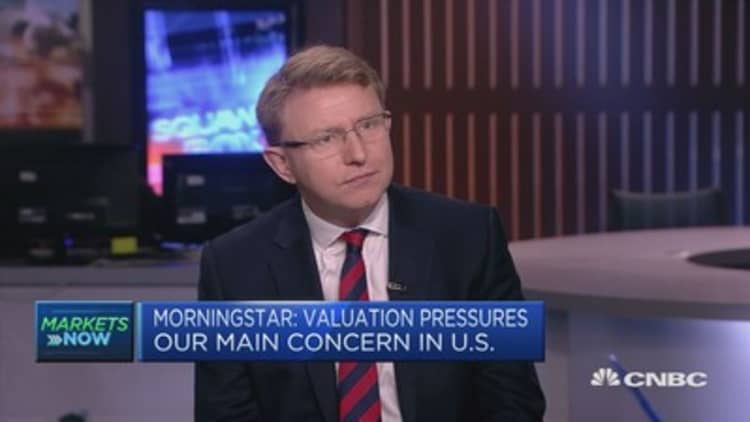Germany's economy could experience a "significant cooling" in 2019 and could see sharply lower growth this year, the country's leading economic institutes have warned in a report compiled for Germany's economics ministry.
Forecasts for German growth were revised significantly downwards in a 'Joint Economic Forecast' collated by several prominent German economic research institutes and published Thursday, with economists predicting a meager 0.8% this year.
This is more than one percentage point lower than a prediction for 1.9% made in a joint economic forecast in fall 2018.
"The long-term upswing of the German economy has come to an end," Oliver Holtemöller, head of the Department of Macroeconomics and vice president of the Halle Institute for Economic Research (IWH), which coordinated this spring's report.
This weaker momentum was triggered both by the international environment and by industry-specific events, the report noted.
"The global economic environment has deteriorated – due in part to political risks – and the manufacturing sector is struggling with obstacles to production. Germany's economy is currently going through a cooling-off phase in which capacity shortages in the economy as a whole are declining," the report noted.
However, the institutes noted that, so far, they consider the chance of a pronounced recession with negative rates of change to gross domestic product (GDP) over several quarters to be slight – at least as long as the political risks do not intensify further.
The report was compiled by economic research institutes including the closely-watched Ifo and RWI institutes and is published twice a year on behalf of the German Federal Ministry for Economic Affairs and Energy.

Bleak, for now
The report comes as economic data from export-orientated economy Germany, the traditional growth driver of Europe, comes under increased scrutiny.
Germany's economy contracted in the third-quarter and then posted flat growth in the fourth quarter of 2018, narrowly avoiding a technical recession. More negative news came Thursday as data showed German factory orders fell 4.2 percent in February, official data showed, marking their sharpest fall since January 2017.
Earlier this week on Monday, Germany's manufacturing PMI fell to its lowest level (of 44.1) since July 2012 signalling faster decreases in output, new orders and export sales, IHS Markt and BME, which compile the data, said, although services PMI data released Wednesday was more optimistic, with services business activity at a six-month high (at 55.4 in March).
The general growth slowdown in Germany has been attributed to upheavals in the nation's traditional growth driver, its car industry (and it having to adapt to new emissions tests known as the WLTP), coupled with the prospect of possible U.S. import tariffs on European cars and a wider global slowdown affecting demand.
The 'Joint Economic Forecast' noted that while the global economic environment had contributed to poor German growth, "the main factors exacerbating the slowdown in the second half of 2018 were problems in the automotive industry and the low water level of the Rhine." The river is very important for German industry as it's used to transport raw materials to German manufacturers and to distribute goods. Low water levels have meant less and less cargo can be transported.
"Still, a slower rate of expansion had already become apparent due to production bottlenecks; the proportion of companies reporting production obstacles due to supply bottlenecks and a shortage of skilled workers had reached historic highs by the middle of last year." the report added.
In 2019, the economy will probably stabilize, the institutes said, but without returning to the high momentum of previous years.
"The production problems caused by the low water level in the Rhine have been resolved, and the automotive industry should soon overcome its difficulties in switching over to the WLTP standard. This in itself would argue for a strong increase in production in the manufacturing sector. However, recovery in vehicle production has so far been sluggish," they said, due to a build up of large stocks in recent months (hence deterring further production).
Noting that the low GDP growth in 2019 is due to the weak momentum at the turn of the year, the report said that the economic outlook is not as bleak as the 0.8 percent growth rate might suggest.
"The institutes estimate the average annualised quarterly growth rate, which reflects the change in GDP over the four quarters of 2019, to be 1.4 percent and thus close to the potential growth rate of the German economy. The institutes are holding firm to their GDP forecast for 2020." The institutes predicted GDP would increase by 1.8 percent in 2020.

Barclays economists Radu-Gabriel Cristea and Iaroslav Shelepko said in a note Thursday that despite idiosyncratic headwinds now abating (such as the shallow Rhine, WLTP implementation) and the relative resilience of domestic demand, Germany remains heavily exposed to deteriorating global factors.
"Healthier internal demand may prove insufficient to offset lost global demand and confidence amid U.S.-China trade wars, the risk of U.S. tariffs on EU-made cars, Brexit or the global growth weakness," they said in a note Thursday.
"On the upside, China credit stimulus and a Sino-U.S. trade agreement should help, while strong fiscal stimulus, coupled with additional monetary accommodation from the European Central Bank, should provide a further boost. Therefore, we continue to project that German growth will pick up by the middle of the year."


